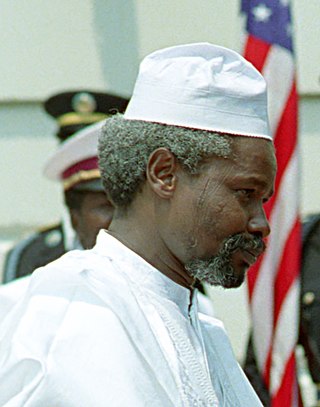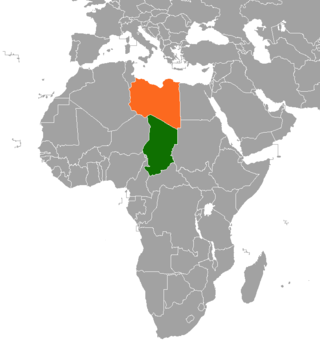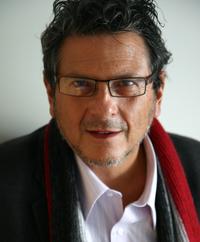| |||||
| Decades: | |||||
|---|---|---|---|---|---|
| See also: | |||||
Events in the year 2011 in Chad .
| |||||
| Decades: | |||||
|---|---|---|---|---|---|
| See also: | |||||
Events in the year 2011 in Chad .
The Chad National Army consists of the five Defence and Security Forces listed in Article 185 of the Chadian Constitution that came into effect on 4 May 2018. These are the National Army, the National Police, the National and Nomadic Guard (GNNT) and the Judicial Police.

Hissène Habré, also spelled Hissen Habré, was a Chadian politician and convicted war criminal who served as the 5th president of Chad from 1982 until he was deposed in 1990.

Idriss Déby Itno was a Chadian politician and military officer who was the 6th president of Chad from 1991 until his death in 2021 during the Northern Chad offensive. His term of office of more than 30 years makes him Chad's longest-serving president.
Goukouni Oueddei is a Chadian politician who served as President of Chad from 1979 to 1982.

FROLINAT was an insurgent rebel group active in Chad between 1966 and 1993.
The Transitional Government of National Unity was the coalition government of armed groups that nominally ruled Chad from 1979 to 1982, during the most chaotic phase of the long-running civil war that began in 1965. The GUNT replaced the fragile alliance led by Félix Malloum and Hissène Habré, which collapsed in February 1979. GUNT was characterized by intense rivalries that led to armed confrontations and Libyan intervention in 1980. Libya intervened in support of the GUNT's President Goukouni Oueddei, against the former GUNT Defence Minister Hissène Habré.
The Kano Accord was preceded by the collapse of central authority in Chad in 1979, when the Prime Minister, Hissène Habré, had unleashed his militias on February 12 against the capital N'Djamena and the sitting president, Félix Malloum. To route the President's forces, Habré had allied himself with the rival warlord Goukouni Oueddei, who entered N'Djamena on February 22 at the head of his People's Armed Forces (FAP).
Acyl Ahmat Akhabach (1944–1982) was a Chadian Arab militia leader during the Chadian Civil War. He was the head of the Democratic Revolutionary Council until his death in 1982, and served as the foreign minister in Goukouni Oueddei's government.

The Toyota War, also known as the Great Toyota War, which took place in 1987 in Northern Chad and on the Chad–Libya border, was the last phase of the Chadian–Libyan War. It takes its name from the Toyota pickup trucks, primarily the Toyota Hilux and the Toyota Land Cruiser, used to provide mobility for the Chadian troops as they fought against the Libyans, and as technicals. The 1987 war resulted in a heavy defeat for Libya, which, according to American sources, lost one tenth of its army, with 7,500 men killed and US$1.5 billion worth of military equipment destroyed or captured. Chadian forces suffered 1,000 deaths.

Chad–United States relations are the international relations between Chad and the United States.

Chad–Libya relations have arisen out of centuries from ethnic, religious, and commercial ties.
Chad is a country in Africa bordering Libya. The Central Intelligence Agency (CIA) is the main intelligence agency of the United States of America. The CIA was active in Chad in the 1980s, due to what the US perceived as a strategic interest in limiting the power of its opponent Muammar Gaddafi, who had ruled Libya since 1969.
The National Union for Independence and Revolution was the ruling party in Chad between 1984 and 1990. It was founded in June 1984 by President Hissène Habré as a successor of his Armed Forces of the North, the insurgent group through which Habré had conquered power in 1982. The party was banned six years later by Idriss Déby when he assumed power by overthrowing Habré in the 1990 coup d'état.
Jacqueline Moudeina is a Chadian lawyer and human rights activist, who is known for her work in bringing Hissène Habré to justice for crimes against humanity, as well as those who worked with him.

Reed Brody is a Hungarian-American human rights lawyer and prosecutor. He specializes in helping victims pursue abusive leaders for atrocities, and has gained fame as the "Dictator Hunter". He was counsel for the victims in the case of the exiled former dictator of Chad, Hissène Habré – who was convicted of crimes against humanity in Senegal – and has worked with the victims of Augusto Pinochet and Jean-Claude “Baby Doc” Duvalier. He currently works with victims of the former dictator of Gambia, Yahya Jammeh. He is the author of several books including To Catch a Dictator: The Pursuit and Trial of Hissène Habré (2022).
The Commission of Inquiry into the Crimes and Misappropriations Committed by Ex-President Habré, His Accomplices and/or Accessories was established on December 29, 1990, by the President of Chad, Idriss Déby. Its goal was to investigate the "illegal detentions, assassinations, disappearances, torture, mistreatment, other attacks on the physical and mental integrity of persons; plus all violations of human rights, illicit narcotics trafficking and embezzlement of state funds between 1982 and 1990", when former President Hissène Habré was in power.
This article is a list of events in the year 2005 in Chad.

The 1990 Chadian coup d'état took place on 3 December 1990 when the forces of the Patriotic Salvation Movement (MPS), a Libyan–backed rebel group under the leadership of General Idriss Déby, entered the Chadian capital N'Djamena unopposed. The MPS troops entered Chad by crossing the Sudanese border three weeks earlier.
Events in the year 2012 in Chad.
Events in the year 2013 in Chad.